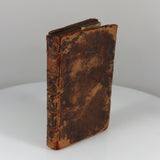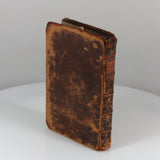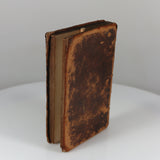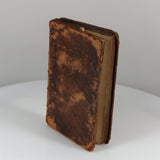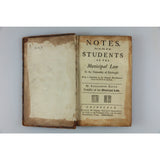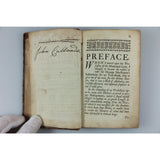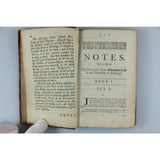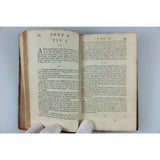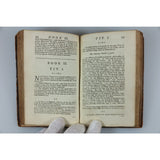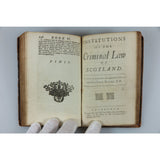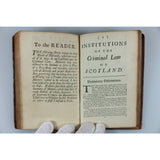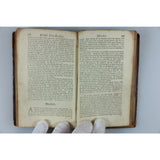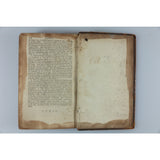Bayne's Notes on Scottish Criminal and Municipal Law
Bayne, Alexander. Notes for the Use of the Students of the Municipal Law in the University of Edinburgh: Being a Supplement to Sir George MacKenzie’s Institutions. (with) Institutions of the Criminal Law of Scotland: For the Use of the Students who attend the Lectures of Alexander Bayne, J.P. Edinburgh: Printed by W. Cheyne. Sold by G. Crawfurd, 1749; Edinburgh: Printed for, and sold by Gideon Grawfurd Bookseller, at his shop in the Parliament-Close, 1748.
Notes: ESTC T130227; Institutions: ESTC T143102
Notes: Second printing (after 1731 original printed by Thomas and Walter Ruddimans); First Thus.; Institutions: Second printing (after 1730 original printed by Thomas and Walter Ruddimans); First Thus. Binding: Hardcover (Full Leather). Book Condition: Very Good Condition. Item Type: Book.
Pagination: [i]-iv, 1-156; [i]-[ii], 1-70. P. 23 misnumbered 41. Size: 6"-7" - Sextodecimo (16mo).
In the preface to Notes, Bayne explains that although he used MacKenzie’s book as his text he provided additional material in his lectures that he wanted his students to write down “to enable them to retain the Memory of what had been thus discoursed to them at large.” Therefore, he had “hitherto avoided the printing of them.” Students being students, however, manuscript copies of the notes were being circulated, which Bayne found to be “very incorrect.” As a result, he “thought it better to provide correct printed Copies for the Use of my Students, than to let them take up with the incorrect Manuscript Copies of others.” In a not-too-subtle hint, Bayne concludes by encouraging “those who shall be disposed to make Use of their Pen, in the Course of their Studies” to continue to take good notes in class and additional information will be provided in his lectures.
The briefer preface to Institutions indicates a similar genesis for the work. “Hitherto [the contents] were dictated to the Students to serve in Place of a Text-Book,” he writes. “But, perceiving that the taking them down in Writing was a Trouble from which my Hearers wished to be relieved, I have been induced to print them for their greater Ease.” The list of topics suggest the course was interesting: Blasphemy, High-Treason, Sedition, Deforcement (resisting arrest, which can result in “Transportation to the King’s Plantations in America”), Breaking of Prison, Bigamy, Adultery, Rape, Incest, Wilful Fire-Raising, Murder, Parricide (“hasten[ing] the fate” of a family member), Self-Murder (hard to prosecute “because the Offender is out of the Reach of suffering”), Duels, Poisoning, Theft (including aiding – Theftboot – and abetting – Reset of Theft), Robbery, Falshood, Stellionate (various forms of fraud), Perjury, Usury and Injuries (including Libel).
ESTC shows eight institutions holding Notes in the UK, two in the U.S. and one in Canada. WorldCat adds the National Library of Scotland (OCLC No. 316753273). ESTC shows seven libraries with copies of Institutions, five in the UK and two in the U.S. WorldCat adds the National Library of Scotland (OCLC No. 614458359).
Bound in calf over boards. The leather of the binding is heavily worn, particularly at the corners where the boards are showing through. The spine has six compartments but is missing the label for the title. The hinges are heavily worn with a 2 1/2" split at the head of the front hinge (though the cords are holding) and 3/8" at the head of the rear hinge. The end papers and blank leaves are missing from the front and rear, exposing the hinges.
The text block is tight. The pages are lightly tanned but remain bright and without any foxing and only minimal scattered spotting. However, any blank leaves are missing, so the block begins with the title page and ends with the final page of text. As a result, the first and last pages are heavily browned around the edges where they have been exposed to the glue from the inside covers. Page edges are browned.
Two previous owners have signed their names on the verso of the title page: John Blair (crossed through) and John Callander. Interestingly a John Callander shows up in the Dictionary of National Biography, 1855-1900. This could be a match since Callander “passed advocate at the Scottish bar,” although he “never obtained a practice.” If this is one and the same person, he apparently didn’t pay enough attention to Bayne’s lectures. The DNB reports Callender published several books that turned out to have “borrowed without acknowledgment” material from other sources.
Shipped Weight: 0 lbs 8 oz.
Inventory No: 1243.













